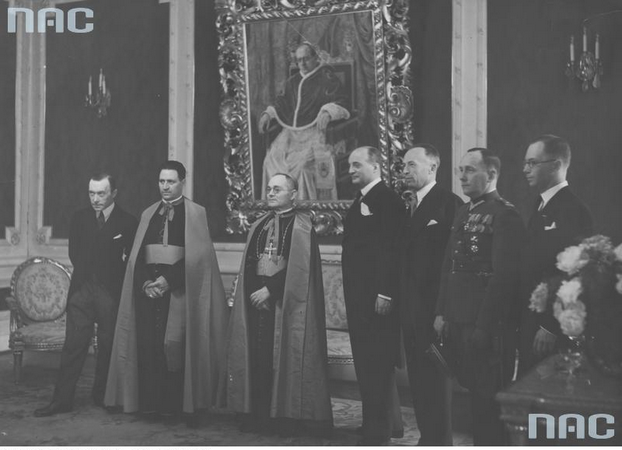Relations between the Holy See and the Polish Government had undergone some strain through the last years of the 1930s. Arguments over the placement and adornment of the tomb of Marshal Pilsudski had caused serious ructions between Church and State. The arrival of the new nuncio Filippo Cortesi in 1936 helped relieve some of the pressure but tensions remained. The language of Cardinal Maglione's telegram suggests something of the lack of dialogue between the government and the nunciature.
For an appreciation of something of the context surrounding Vatican-Polish relations I have included an extract from Neal Pease's Rome's Most Faithful Daughter (2009). The document mentioned in this extract was not included in ADSS. I have highlighted the relevant section. I do not know at this stage if Cortesi sent an account of the meeting to Rome, but it would have been unusual if he did not. Had it been included it would be between ADSS 1.13-17. ADSS does contain significant documentation (ADSS 1 documents up to 170) that supports Pease's theory and I confess to being somewhat disappointed that he did not make mention of it.
For an appreciation of something of the context surrounding Vatican-Polish relations I have included an extract from Neal Pease's Rome's Most Faithful Daughter (2009). The document mentioned in this extract was not included in ADSS. I have highlighted the relevant section. I do not know at this stage if Cortesi sent an account of the meeting to Rome, but it would have been unusual if he did not. Had it been included it would be between ADSS 1.13-17. ADSS does contain significant documentation (ADSS 1 documents up to 170) that supports Pease's theory and I confess to being somewhat disappointed that he did not make mention of it.
ADSS 1.6
Luigi Maglione to Filippo Cortesi, Warsaw
Reference:
Telegram 20 (AES 1528/39)
Location
and date: Vatican, 01.04.1939
Summary
statement: Request that Cortesi keep Rome informed.
Language:
Italian
Text:
I
have received your Report 202. (1) While I thank your Excellency, I ask that,
in the case of other important news, you keep me informed by coded telegram.
Notes:
(1)
See ADSS 1.4.
Filippo Cortesi, nuncio and Alfredo Pacini, secretary,
at a reception at the Nunciature in Warsaw, 1937.
(Image source: http://www.audiovis.nac.gov.pl/obraz/47697/)





No comments:
Post a Comment
You are welcome to post a comment. Please be respectful and address the issues, not the person. Comments are subject to moderation.